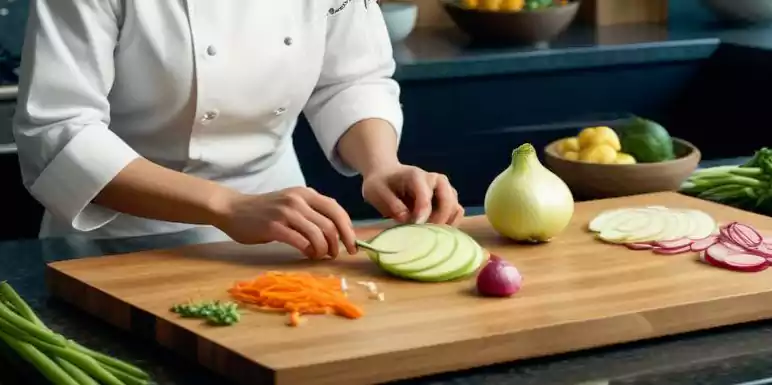
Using cutting boards is an essential practice for preserving the integrity and appearance of your countertops. Here’s a detailed explanation of why cutting boards are crucial and how they help maintain your countertop’s condition:
Preventing Scratches and Knife Marks
Countertops, whether made of granite, quartz, marble, or any other material, can be easily scratched or marked by knives and other sharp utensils. Here’s why cutting boards are important:
- Preserve Surface Integrity: Regularly chopping or slicing directly on the countertop can cause unsightly scratches and gouges. Cutting boards provide a buffer between your knives and the countertop, keeping the surface smooth and free from damage.
- Maintain Aesthetic Appeal: Scratches and knife marks can detract from the visual appeal of your countertops. By using a cutting board, you help maintain the pristine appearance of your countertop material.
Choosing the Right Cutting Board
Selecting the right type of cutting board can further enhance the protection of your countertops:
Material Options:
- Wood Cutting Boards: These are popular for their durability and natural antibacterial properties. They are gentle on knives and countertops but require regular maintenance, such as oiling, to prevent drying and cracking.
- Plastic Cutting Boards: These are easy to clean and sanitize, making them a hygienic choice for food preparation. They are generally less likely to damage knives compared to other materials.
- Bamboo Cutting Boards: A sustainable alternative, bamboo boards are hard and durable, providing good protection for both knives and countertops. They require similar maintenance to wood boards.
Size and Thickness: Choose a cutting board that is large enough to accommodate your food preparation needs and thick enough to provide a sturdy surface. A thicker board is less likely to warp or crack under pressure.

Proper Cutting Board Care
To ensure your cutting boards remain effective and hygienic:
- Regular Cleaning: Clean cutting boards after each use with hot, soapy water. For plastic boards, you can use a disinfectant or bleach solution to sanitize them. Wooden boards should be scrubbed with a mixture of vinegar and baking soda, then rinsed and dried thoroughly.
- Avoid Cross-Contamination: Use separate cutting boards for different types of food, such as meats and vegetables, to avoid cross-contamination and maintain food safety.
- Storage: Store cutting boards in a clean, dry area. Avoid leaving them in standing water or in direct sunlight, which can cause warping or damage.
Additional Tips for Countertop Care
- Use Trivets and Hot Pads: To prevent heat damage, always use trivets or hot pads under hot pots and pans. This helps protect the surface from heat-induced discoloration or warping.
- Regular Sealing: For natural stone countertops, regular sealing is essential to prevent stains and moisture damage. Follow the manufacturer’s recommendations for the best results.

